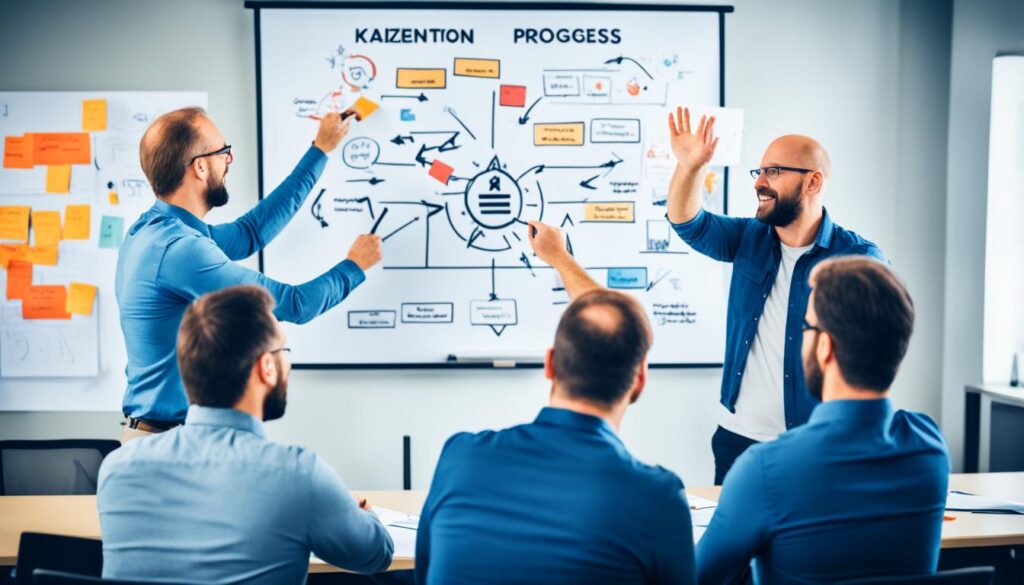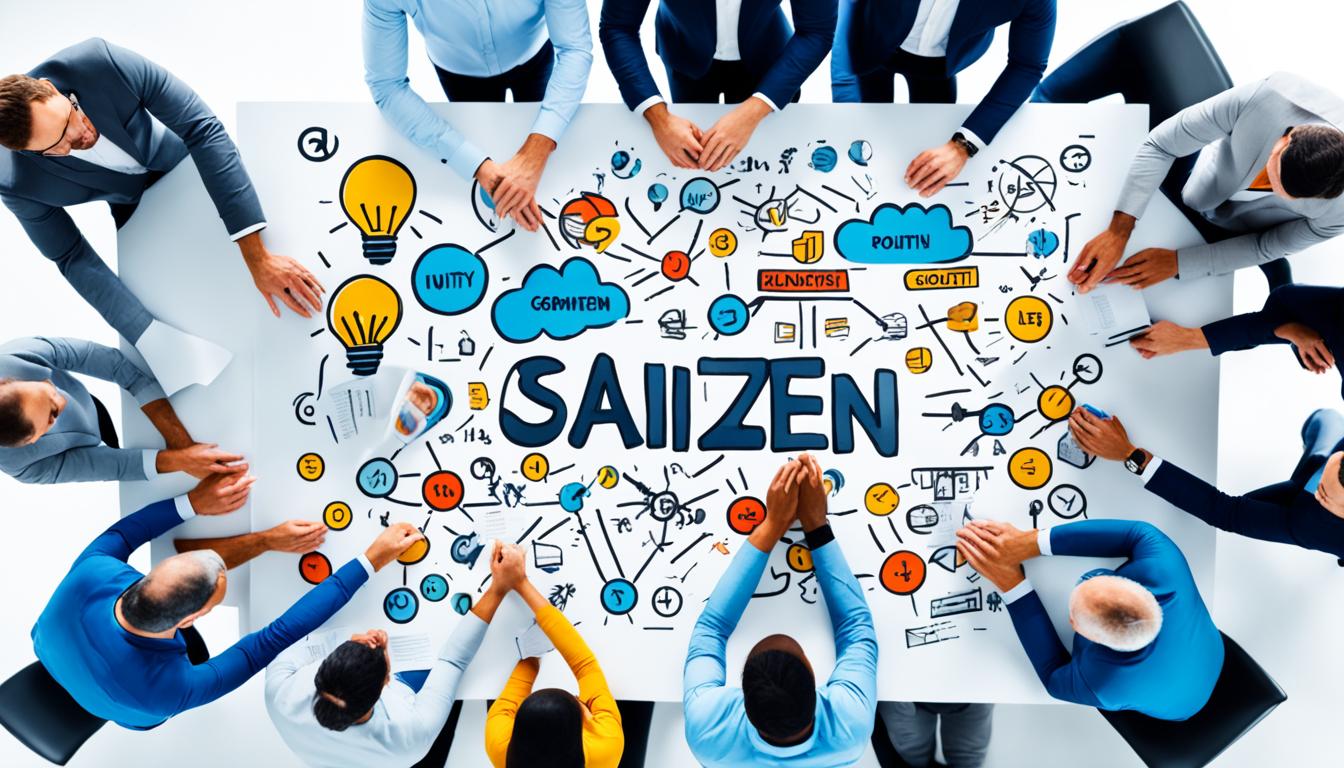Imagine a company where teams work seamlessly together, continuously improving processes, and achieving outstanding results. Meet ABC Corporation, a highly successful organization that attributes its success to the implementation of the Kaizen philosophy.
It all started when the company faced a significant setback. Despite having skilled employees and cutting-edge technology, ABC Corporation struggled with team dynamics and stagnant productivity. The management realized that they needed a fresh approach to drive continuous improvement and foster teamwork.
That’s when they turned to the Kaizen philosophy. By embracing the principles of kaizen, ABC Corporation unlocked a new level of team dynamics. They encouraged their employees to come together, collaborate, and analyze their work processes to identify small, incremental improvements.
One day, during a team meeting, Jennifer, a dedicated employee, suggested a simple change to streamline their production line. Her idea was small, but it sparked a series of improvements that ripple throughout the organization. Other team members began sharing their ideas, leading to a culture of innovation, engagement, and continuous improvement.
As the weeks went by, ABC Corporation witnessed a remarkable transformation. The teams became more cohesive, communication improved, and productivity soared. With the Kaizen philosophy firmly embedded in their culture, the company experienced a renewed sense of energy and accomplishment.
Today, ABC Corporation serves as a shining example of how the Kaizen philosophy can boost team dynamics, drive continuous improvement, and propel organizations to new heights of success.
Key Takeaways:
- The Kaizen philosophy emphasizes continuous improvement and teamwork.
- By involving employees at all levels, organizations can foster a culture of collaboration and innovation.
- Small, incremental improvements lead to significant progress over time.
- Kaizen training improves employee engagement and instills a continuous improvement mindset.
- Kaizen principles can help business leaders streamline workflows and boost productivity.
Understanding the Kaizen Philosophy
The Kaizen philosophy, derived from the Japanese term meaning “continuous improvement,” advocates for making small, incremental changes in work processes and systems. It recognizes the value of employee input and promotes collaboration and teamwork. Kaizen emphasizes the importance of continuous improvement through small steps, believing that these steps lead to significant progress over time.
By implementing the Kaizen philosophy, organizations can create a culture that encourages employees to contribute their ideas and suggestions for improvement. This collaborative approach ensures that every team member is actively involved in the process of continuous improvement, leading to greater engagement and ownership of their work.
“Kaizen is all about fostering a culture of collaboration and shared responsibility. By involving employees at all levels, we can tap into the collective knowledge and creativity of the entire workforce to drive continuous improvement.”
Kaizen also places a strong emphasis on waste reduction. It aims to eliminate inefficiencies in material usage, time management, and movement within the work environment. By identifying and addressing these areas of waste, organizations can improve productivity, reduce costs, and enhance overall efficiency.
The Kaizen philosophy recognizes that significant improvements can be achieved through small, consistent steps. Rather than waiting for large-scale transformations, Kaizen encourages employees to identify and implement small changes that can be easily incorporated into their daily routines. Over time, these incremental improvements add up and lead to significant advancements in productivity and quality.
The Benefits of Collaboration in Kaizen
Collaboration is at the heart of the Kaizen philosophy. By working together, employees can pool their knowledge, skills, and ideas to identify improvement opportunities and develop effective solutions. Collaborative efforts foster a sense of camaraderie and create a supportive environment where everyone feels empowered to contribute their best.
Furthermore, collaboration in Kaizen promotes cross-functional cooperation. Different teams and departments come together to share insights and perspectives, resulting in a holistic approach to problem-solving. This interdisciplinary collaboration allows organizations to uncover innovative solutions and make comprehensive improvements across various areas of their operations.
Overall, the Kaizen philosophy, with its focus on continuous improvement, small steps, and collaboration, offers organizations a systematic approach to drive progress and enhance efficiency. By embracing Kaizen principles and fostering a culture of continuous improvement, organizations can unlock the full potential of their teams, optimize their workflows, and achieve sustainable growth.
Key Benefits of Kaizen Training
Kaizen training offers several benefits to workforce development. Through the implementation of kaizen principles and practices, organizations can foster a culture of continuous improvement and enhance employee engagement and productivity.
Employee Engagement and Ownership
One of the key benefits of kaizen training is its ability to improve employee engagement. By involving employees in the process of continuous improvement, organizations empower them to take ownership of their work and contribute valuable ideas. When employees feel heard and valued, they are more motivated and committed to their roles, leading to increased productivity and satisfaction.
Kaizen training also fosters a sense of ownership and empowerment among employees. By encouraging them to identify and implement small improvements in their work processes, employees develop a sense of pride and responsibility for their work. This cultivates a positive work environment where everyone takes ownership of the continuous improvement mindset.
Culture of Innovation and Adaptability
Another significant benefit of kaizen training is its impact on cultivating a culture of innovation and adaptability. Kaizen encourages employees to challenge the status quo, think creatively, and embrace change. By regularly seeking opportunities for improvement, employees become more open-minded, adaptable, and solution-oriented.
Through kaizen training, organizations can create an environment where ideas are encouraged, and innovation is celebrated. This culture of innovation not only leads to process improvements but also inspires employees to think outside the box and contribute to the organization’s overall growth and success.
Continuous Improvement Mindset
Kaizen training instills a continuous improvement mindset among employees. It teaches them to proactively seek out areas for improvement and embrace a mindset of constant learning and growth. By equipping employees with the tools and techniques for continuous improvement, organizations can achieve sustained efficiency gains and long-term business growth.
With a continuous improvement mindset, employees become more self-reflective, open to feedback, and willing to challenge existing practices. They actively contribute to the organization’s journey of improvement, thereby creating a culture that thrives on innovation, adaptation, and excellence.

Implementing kaizen training in the workplace is an investment in the development and success of both employees and the organization as a whole. By prioritizing employee engagement, fostering a culture of innovation, and instilling a continuous improvement mindset, organizations can unlock their full potential and achieve sustainable growth.
Improving Efficiency for Employees
Kaizen training is a powerful tool for enhancing efficiency in the workplace. By focusing on continuous improvement and making small, consistent improvements over time, organizations can optimize productivity levels and unlock their employees’ full potential. Unlike drastic changes that may overwhelm employees, Kaizen encourages them to identify small areas for improvement and implement incremental changes that can have a significant impact.
One of the key principles of Kaizen is analyzing processes and involving employees in the improvement process. This approach not only empowers employees to contribute their ideas and suggestions but also creates a sense of ownership and pride in their work. When employees feel valued and have the opportunity to actively participate in making small improvements, they become more engaged and motivated, leading to increased efficiency and productivity.
Implementing Kaizen training helps organizations foster a culture of continuous improvement, where every employee is encouraged to seek out ways to optimize their workflows and eliminate waste. By continuously striving for small improvements, employees can achieve higher levels of efficiency and effectiveness in their daily tasks, ultimately contributing to the overall success of the organization.
Benefits of Kaizen Training for Improving Efficiency:
- Enhanced productivity levels through continuous improvement
- Increased employee engagement and motivation
- Empowerment of employees to contribute ideas and suggestions
- Development of a culture of continuous improvement
“The secret of getting ahead is getting started.” – Mark Twain
By adopting the Kaizen philosophy and providing training to employees, organizations can drive small but impactful improvements that lead to significant efficiency gains. Through the continuous pursuit of small improvements, organizations can elevate their productivity levels to new heights and create a workplace where innovation and success thrive.
| Benefits of Kaizen Training | Impact on Efficiency |
|---|---|
| Increased employee engagement | Boosts productivity levels |
| Fosters a culture of continuous improvement | Optimizes workflows and eliminates waste |
| Encourages employee empowerment | Enhances overall efficiency in daily tasks |

Boosting Productivity for Business Leaders
Kaizen training offers valuable tools and techniques for business leaders to boost productivity and drive continuous improvement within their organizations. By implementing Kaizen principles, leaders can optimize workflows, reduce waste, and cultivate problem-solving skills that empower their teams. Additionally, adopting a coaching leadership style can further enhance employee engagement and foster a culture of continuous improvement.
One of the core focuses of Kaizen training is waste reduction. This involves analyzing processes, eliminating unnecessary steps, and streamlining workflows to eliminate any wasted time, effort, or resources. By identifying and addressing areas of waste, business leaders can make their operations leaner, more efficient, and ultimately more productive.
Beyond waste reduction, Kaizen training equips leaders with valuable problem-solving skills. Through various problem-solving methodologies such as root cause analysis and the Plan-Do-Check-Act (PDCA) cycle, leaders can effectively identify and resolve issues that hinder productivity. This allows for continuous improvement and preventative measures to be implemented, ensuring that problems are addressed promptly and effectively.
A coaching leadership style is another key attribute fostered through Kaizen training. This leadership approach emphasizes employee development, empowerment, and engagement. A coaching leader provides support, guidance, and encouragement to their team members, helping them develop problem-solving skills and take ownership of their work. This coaching approach fosters a culture of continuous improvement and enhances team dynamics, leading to increased productivity and collaboration. Furthermore, by implementing optimizing team dynamics strategies, coaching leaders can create an environment where open communication and trust thrive. This not only enables team members to share ideas and feedback freely but also encourages them to learn from each other’s experiences. Ultimately, this collaborative atmosphere allows for more innovative solutions and a stronger sense of unity within the team.
By incorporating Kaizen principles into their leadership practices, business leaders can achieve significant improvements in productivity. The waste reduction strategies and problem-solving skills gained through Kaizen training enable leaders to optimize processes and empower their teams to work more efficiently. Furthermore, a coaching leadership style builds trust and fosters a culture of continuous improvement, motivating employees to strive for excellence and consistently contribute to organizational success.
Kaizen training provides business leaders with the tools and techniques necessary to boost productivity through waste reduction, problem-solving skills, and a coaching leadership style. By leveraging these principles, leaders can enhance team performance and create a work environment that encourages continuous improvement.
Implementing Kaizen for Workforce Development
Implementing Kaizen for workforce development involves creating a culture that embraces continuous improvement and encourages employee involvement. To achieve this, organizations should prioritize regular communication, training sessions, and workshops that highlight the importance of Kaizen principles.
By implementing Kaizen, organizations can foster a culture of continuous improvement, where employees are empowered to contribute their ideas and actively participate in the enhancement of processes and workflows. Employee involvement is crucial in cultivating a sense of ownership and promoting a collaborative environment where everyone is committed to achieving excellence.
Training plays a vital role in successful Kaizen implementation. It equips employees with the necessary skills and mindset for continual progress and improvement. By providing comprehensive training programs, organizations can ensure that employees understand the Kaizen philosophy, methodologies, and tools required to identify areas of improvement and implement changes effectively.
Employee training should focus on:
- Introducing the principles of Kaizen and its benefits
- Teaching problem-solving skills and techniques
- Developing a mindset of continuous improvement
- Emphasizing the importance of data analysis and measurement
- Promoting teamwork and collaboration
Through these training initiatives, organizations empower their workforce to contribute actively to the culture of continuous improvement and take ownership of their professional development. Employees become equipped with the necessary skills to identify process inefficiencies, suggest improvements, and implement changes that drive overall productivity and growth.
It is essential for organizations to provide ongoing support and resources to sustain the Kaizen culture. This includes regular follow-ups, progress monitoring, and recognizing employee contributions to reinforce the importance and impact of Kaizen. By nurturing a culture of continuous improvement and employee involvement, organizations can unlock their full potential, achieve operational excellence, and stay competitive in today’s rapidly evolving business landscape.
Examples of Successful Kaizen Implementation:
| Company | Implementation Strategy | Results |
|---|---|---|
| Toyota | Employee involvement through suggestion systems and cross-functional teams | Significant waste reduction, increased productivity, and improved quality |
| Tesco | Regular training programs and employee engagement initiatives | Streamlined processes, reduced costs, and improved customer satisfaction |
| General Electric | Strong leadership support and development of a culture of continuous improvement | Enhanced efficiency, cost savings, and innovation across the organization |
Conclusion
The Kaizen philosophy and training offer a transformative approach to enhancing team dynamics and driving continuous improvement. By embracing the principles of Kaizen, organizations can establish a culture that fosters collaboration, boosts employee engagement, and improves overall productivity. Organizations that implement Kaizen often find that enhancing team collaboration strategies becomes a natural outcome of their efforts. Employees are encouraged to share ideas and insights, leading to innovative solutions and increased morale. As everyone works together toward common goals, the collective ownership of projects strengthens, driving not only individual growth but also the organization’s success as a whole.
Kaizen emphasizes making small, incremental changes and reducing waste, empowering employees at all levels to contribute to continuous improvement. This approach enables teams to identify areas for improvement and implement targeted solutions, leading to enhanced team dynamics and performance.
Implementing Kaizen requires organizations to provide comprehensive training and create an environment that encourages employee involvement. By equipping employees with the necessary skills and mindset through training sessions and workshops, organizations can cultivate a culture of continuous improvement and achieve long-term success.
Incorporating the Kaizen philosophy into everyday operations not only enhances team dynamics but also drives productivity. By optimizing workflows and eliminating inefficiencies, organizations can streamline their processes and tap into the full potential of their workforce.
FAQ
What is the Kaizen philosophy?
The Kaizen philosophy, derived from the Japanese term meaning “continuous improvement,” advocates for making small, incremental changes in work processes and systems. It emphasizes collaboration, teamwork, and involving employees at all levels within an organization.
What are the key benefits of Kaizen training?
Kaizen training offers several benefits to workforce development. It improves employee engagement by involving employees in the process of continuous improvement and fostering a sense of ownership and empowerment. Kaizen also cultivates a culture of innovation and adaptability, encouraging employees to challenge the status quo and embrace change.
How does Kaizen training improve efficiency for employees?
Kaizen training helps improve efficiency for employees by focusing on continuous improvement and making small, consistent improvements over time. By analyzing processes and involving employees in the improvement process, Kaizen enhances productivity levels and unlocks employees’ full potential.
How does Kaizen training benefit business leaders?
Kaizen training benefits business leaders by focusing on waste reduction and process optimization. It equips leaders with problem-solving skills and encourages a coaching leadership style, empowering employees and fostering a culture of continuous improvement.
How can organizations implement Kaizen for workforce development?
Implementing Kaizen for workforce development involves creating a culture that embraces continuous improvement and encourages employee involvement. Organizations can achieve this through regular communication, training sessions, and workshops that highlight the importance of Kaizen principles.
How does the Kaizen philosophy boost team dynamics?
The Kaizen philosophy and training have the potential to revolutionize team dynamics and drive continuous improvement within organizations. By embracing the principles of Kaizen, organizations foster a culture of collaboration, enhance employee engagement, and improve productivity.


